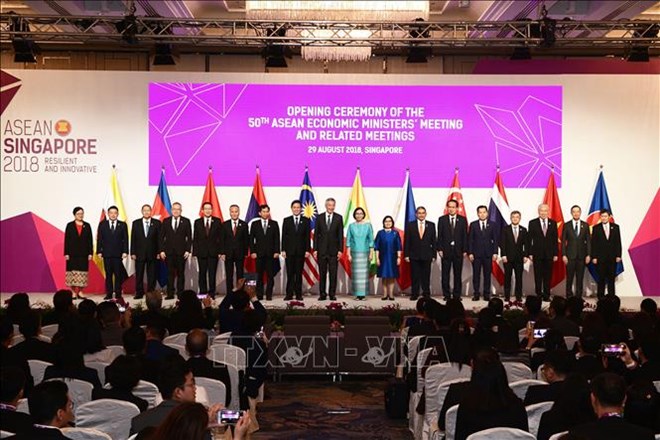
Through the negotiations of the Regional Comprehensive Economic Partnership (RCEP), the Association of Southeast Asian Nations (ASEAN) has affirmed its central role in creating new regional trade architecture that contributes to the multilateral trading system and creating momentums to boost trade liberalisation and commercialisation.

ASEAN economic leaders take photo
at the event (Photo: Xinhua/VNA)
This is particularly important given obstacles posed by
trade protectionism and unilateralism in international trade relations,
participants said at the 50th ASEAN Economic Ministers (AEM-50) Meeting and
Related Meetings, which wrapped up in
Singapore on September 1, after
four days of working.
Economic ministers from ASEAN stated that the AEM-50 has significant meaning to
push negotiations of free trade agreements (FTAs) between ASEAN and its
partners, especially the RCEP.
The negotiations of the RCEP are expected to be concluded at the end of 2018
with important tasks such as building mechanisms on customs procedures and
trade facilitation in the region, competitiveness policy, intellectual
property, elimination of trade barriers, e-commerce development, building ASEAN
trade facilitation indicators, supporting micro, small, and medium enterprises,
optimising trade incentives, and narrowing development gap among ASEAN
countries.
During the AEM-50, ministers focused discussion on ASEAN priorities for
economic-trade cooperation in 2018, reviewed the roadmap to realise its
commitments in agreements and the implementation of priorities in 2018 to look
toward the completion of building the ASEAN Economic Community 2025.
Ministers signed the First Protocol to Amend the ASEAN Trade in Goods Agreement
(ATIGA) to allow the operationalisation of the ASEAN-wide Self-Certification
(AWSC), and the Protocol to implement the 10th ASEAN Framework Agreement on
Services (AFAS).
That businesses are allowed to self-certify the origin of their products is
considered a significant stride in ASEAN to support enterprises, especially
small and medium sized ones, to make better use of incentives within ASEAN
framework.
Such outcomes will be further promoted to report at the 33rd ASEAN Summit and
related meetings in November in
Singapore.
Regarding extra-bloc cooperation, ministers underlined positive results that
ASEAN had gained while implementing FTAs with partners such as
India,
China,
the
Republic of
Korea,
Japan,
Australia,
New
Zealand and
China.
Minister of Industry and Trade Tran Tuan Anh, head of the Vietnamese
delegation, said the AEM-50 and related meetings are very significant for
Vietnam in
preparation for the ASEAN meetings in 2020.
Vietnamhas coordinated with other member states to maintain the leading role of ASEAN
as well as push ahead with negotiations to protect the benefits of ASEAN
nations, he said.
With the aim of reaching a high-quality and interest-balance agreement,
Vietnam had
actively joined discussions and put forth proposals in some fields to address
disagreements between the involved parties but still ensure national interests,
he added.
The country has also built a negotiation package on investment for ministers’
approval. Along with other ASEAN countries,
Vietnam has actively contributed to
the conclusion of negotiations of a chapter on customs procedures and trade
facilitation.
On the sidelines of the AEM-50, Minister Tran Tuan Anh met with his
counterparts from
Singapore,
Indonesia and the
Republic of
Korea to discuss bilateral cooperation
as well as regional and multilateral collaboration.
Source: VNA
The first summit between the European Union (EU) and the Gulf Cooperation Council (GCC) in Brussels, Belgium, marked an important step forward in their bilateral relations.
The 45th General Assembly of the ASEAN Inter-Parliamentary Assembly (AIPA-45) opened in Vientiane on October 19.
Many countries are grappling with rapidly aging population. As population aging becomes an irreversible global trend with significant impacts on economic and social sectors, nations face the urgent task of creating flexible policies to adapt to and make the most of this trend to build prosperous and sustainable societies.
With a series of stimulus measures, the world tourism industry is on the way to recovery as before the COVID-19 pandemic broke out. Facing the opportunity to take off, the "smokeless industry” is expected to strongly contribute to global economic growth while promoting potential and cohesion, contributing to peace and sustainable development.
The danger from the COVID-19 pandemic is still latent, threatening people’s health and lives in the context that the immunity provided from the COVID-19 vaccine has decreased. Many other dangerous diseases are also likely to break out when the global vaccination rate slows down, due to inequality in access to health services, vaccine hesitancy, and consequences of economic recession.
The Association of Southeast Asian Nations (ASEAN) is witnessing a rise in the sales of electric vehicles (EVs) in Vietnam, Malaysia and Indonesia, according to Maybank Investment Bank Research (Maybank IB Research).



